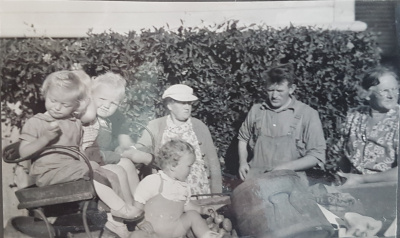Tananger: Back to the roots
Date posted
I am in Tananger, a coastal village on Norway's west coast, close to the town of Stavanger.
Here generations of my mother's family have lived and continue to live, here the cemetery holds graves of members of past generations, here a drowning at sea impacted one branch of the family forever, here my parents married, here I was born, here I was baptized, here I spent all vacations as a child and into my teens, and here I have made countless beautiful, valuable – and sometimes painful – memories that have helped me grow into the person I have become.
Tananger used to be a small village of less than hundred persons, and my ancestors worked mostly in marine activities, including fishing, piloting, merchant marine, and managing lighthouses, in addition to farmi
Recently oil was found in the North Sea, and everything changed almost overnight. Tananger became a centre for oil exploration. The family farm disappeared, and family members became employed in the oil sector. The population mushroomed to several thousand, and the Tananger I knew gradually disappeared. All the while, new generations made their own memories. It is the way of the world everywhere. As for those among us that witness old memories disappas while new generations grow up, I quote Henrik Ibsen (in the play "Brand"), "Evig eies kun det tapte" ("forever owned is only that which is lost").
From one point of view my roots are in the countries I have worked in, inter alia, Australia, Bangladesh, Botswana, Bulgaria, Canada, Chad, Chile, Denmark, Estonia, Ethiopia, France, Germany, Ghana, India, Italy, Indonesia, Lebanon, Mauritania, Mexico, Namibia, Nepal, Niger, Nigeria, Poland, Romania, Slovenia, Sri Lanka, Sweden, Switzerland, United States, Vietnam, and Yemen. To mention only the most important. However, as is obvious, this simply does not work in defining and growing roots. I tried it, and tended towards becoming schizophrenic in terms of roots. I need to focus, and the focus is on Tananger, Norway (Kristiansand and specifically Tananger), and Bulgaria (Sofia)!
Through a life on the move, that is, living and working in numerous countries, Tananger has become synonymous with my roots. The more of it that disappears, the more I remember and recreate of that life, of my family, and of myself. I'm in a good process of defining my roots, and Tananger increasingly becomes a focus in that process. It is a very good process.
Lars T Soeftestad
Notes
(1) Image credit: Ingjerd Meling, ca. 1950. Collection of kitchen/food refuse at the time was privately organized. A local farmer travelled around the village with a horse drawn carriage and collected food scraps that he fed to his pigs. On the carriage, at the back, is me, with long blond curls. Next to me is Inger Marie Meling. The two of us, almost identical in age, were collectively referred to as "Nuppas" and "Nusse", respectively. Behind, with a white cap, is my maternal grandmother. Other family members are also pictured. This is a favorite photo of mine.
(2) Relevant Devblog articles: "Cemeteries and Culture" at: https://devblog.no/en/article/cemeteries-and-culture
(3) Permalink. URL: https://www.devblog.no/en/article/tananger-back-roots
(4) This article was published 24 August 2020. It was revised 27 August 2020.

Add new comment